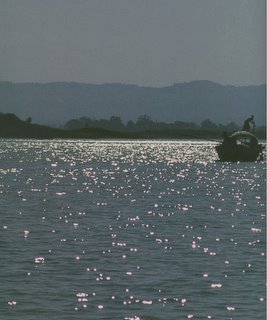Biggest Ever Bangladesh survey: Best Country
The BBC has conducted one of the most comprehensive surveys ever undertaken in Bangladesh.
The Pulse of Bangladesh Survey questioned 5,000 ordinary people from all over the country, including both city and rural areas to find out how Bangladeshis see themselves and their country.

Big worry
The survey revealed that religious leaders were the most trusted in the country.
The issues that most concerned people were unemployment, the prices of essential goods, transport difficulties and population growth. Access to education was also a big worry.
"Our children don't get the same access to schools as people living in the towns," said Mazeda Begum, a villager in the Damrai district of Bangladesh.

Go abroad
But education is not just an issue in rural areas.
Most of those canvassed said that they could not afford to educate their children. Moreover, 65% of respondents said that if children are to have the best start in life, they should be sent abroad.
Views of the poor
About 61% of poor people said that they had little chance of changing their lives. Poor people - in comparison to the upper and middle classes - were more likely to feel that a wife should not work outside the home.
On Bangladesh's democracy, most poorer people felt that elections were free and fair. The majority of poorer people also said that that "the country was governed by the will of the people", and that their "main aim in life was to make more money".
Suspicion
There is a plethora of non-governmental organisations (NGOs) working with the less well off.
But the BBC survey showed suspicion from all sections of society towards NGOs. Only three per cent of those canvassed wanted to give NGOs "more power".
The "least admired occupation" of all was social work, with two per cent of people saying they admired the role of social workers.
'We accept corruption'
The survey showed that people are more worried by natural disasters, poor economic development and the food supply than corruption.
"We just accept corruption as part and parcel of every day life," said 17-year-old villager Jalil Mustafa.
"We are far more interested in what will happen to us should the next harvest fail and we are forced to spend our meagre savings to feed our families."
'Best country'
Most people questioned agreed with the statements "there is little that I can do to change my life" and "money and career are of secondary importance to me compared to family and love."
The overwhelming majority of people were also critical of the police, agreeing with the proposition that they do not serve people equally.
But the majority agreed that Bangladesh is the best country in which to live.
Electricity problems
Nearly half of those canvassed said that "imported products" were better than local goods.
While 99% of those canvassed said that they owned a cot or a bed, only three per cent said that they owned a telephone, and only 20% said that they owned a radio.
Those with electrical goods are likely to have problems operating them. Access to electricity, power cuts and electricity theft are constant problems.
'Stay at home'
Nearly all those canvassed (98%) agreed that "young people should look after their elders".
About three-quarters said that married couples should not leave their parents' home after getting married.
But a majority agreed with the proposition that "cultural traditions have weakened over time".
'I am happy'
Forty-one per cent of those canvassed felt that Bangladeshi people are relaxed and laid back people - 20% that they are industrious. Across all regions, the survey revealed that Bangladeshis see themselves as "friendly, peace-loving and religious".
Continuing this optimistic note over 70% of those canvassed agreed with the statement "I am happy with my life today".
Source: BBC
The Pulse of Bangladesh Survey questioned 5,000 ordinary people from all over the country, including both city and rural areas to find out how Bangladeshis see themselves and their country.

Big worry
The survey revealed that religious leaders were the most trusted in the country.
The issues that most concerned people were unemployment, the prices of essential goods, transport difficulties and population growth. Access to education was also a big worry.
"Our children don't get the same access to schools as people living in the towns," said Mazeda Begum, a villager in the Damrai district of Bangladesh.

Go abroad
But education is not just an issue in rural areas.
Most of those canvassed said that they could not afford to educate their children. Moreover, 65% of respondents said that if children are to have the best start in life, they should be sent abroad.
Views of the poor
About 61% of poor people said that they had little chance of changing their lives. Poor people - in comparison to the upper and middle classes - were more likely to feel that a wife should not work outside the home.
On Bangladesh's democracy, most poorer people felt that elections were free and fair. The majority of poorer people also said that that "the country was governed by the will of the people", and that their "main aim in life was to make more money".
Suspicion
There is a plethora of non-governmental organisations (NGOs) working with the less well off.
But the BBC survey showed suspicion from all sections of society towards NGOs. Only three per cent of those canvassed wanted to give NGOs "more power".
The "least admired occupation" of all was social work, with two per cent of people saying they admired the role of social workers.
'We accept corruption'
The survey showed that people are more worried by natural disasters, poor economic development and the food supply than corruption.
"We just accept corruption as part and parcel of every day life," said 17-year-old villager Jalil Mustafa.
"We are far more interested in what will happen to us should the next harvest fail and we are forced to spend our meagre savings to feed our families."
'Best country'
Most people questioned agreed with the statements "there is little that I can do to change my life" and "money and career are of secondary importance to me compared to family and love."
The overwhelming majority of people were also critical of the police, agreeing with the proposition that they do not serve people equally.
But the majority agreed that Bangladesh is the best country in which to live.
Electricity problems
Nearly half of those canvassed said that "imported products" were better than local goods.
While 99% of those canvassed said that they owned a cot or a bed, only three per cent said that they owned a telephone, and only 20% said that they owned a radio.
Those with electrical goods are likely to have problems operating them. Access to electricity, power cuts and electricity theft are constant problems.
'Stay at home'
Nearly all those canvassed (98%) agreed that "young people should look after their elders".
About three-quarters said that married couples should not leave their parents' home after getting married.
But a majority agreed with the proposition that "cultural traditions have weakened over time".
'I am happy'
Forty-one per cent of those canvassed felt that Bangladeshi people are relaxed and laid back people - 20% that they are industrious. Across all regions, the survey revealed that Bangladeshis see themselves as "friendly, peace-loving and religious".
Continuing this optimistic note over 70% of those canvassed agreed with the statement "I am happy with my life today".
Source: BBC







0 Comments:
Post a Comment
<< Home